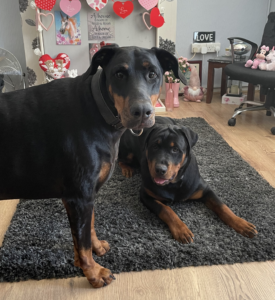Barks Blog
Meet Force-Free Puppy Trainer Colin Spence

Force-free training … is kind. It’s what all animals should get from humans—kindness.
—Colin Spence
Tell us a little bit about yourself. How did you first get into dog training, and what you are doing now?
I got into the industry as a trainer a while ago as I had a 12-week-old German Shepherd puppy who was very human and dog reactive as he was very scared. He would growl and lunge while shivering. I wasgetting somewhat (I now know as) very bad advice from local UK trainers who used some aversive methods. I felt uncomfortable using punishment, but I knew no better until I stumbled across a wonderful trainer who used positive reinforcement. I learned so much from kind, humane training that I have never looked back, and today I’m the founder of Colin’s K9 Training Services and am a certified behavior practitioner and trainer. I cater for young puppies to get the very best training in our classes, and service ourclients with scent classes for puppies and older dogs. We also have classes for dogs who struggle aroundhumans and other dogs where they can have lots of space and can process the environment at their own pace while working with different smells and surfaces. I love my work with dogs and their humans and won’t be retiring any time soon.
Tell us a little bit about your own pets.
I recently lost my male Rottweiler, Rico, to bone cancer, but still have two wonderful companions in Zara, my female Doberman, and Bailey, a young 7-month-old Rottweiler. They get along very well and are such a pleasure to live with.
What do you consider your area of expertise?
Working with puppies is my specialty niche.
Why did you become a dog trainer?
I wanted to help struggling pet owners with humane dog training and advice, and also I just love being around dogs.
Are you a crossover trainer or have you always been a force-free trainer?
I was first taught methods of the balanced kind, but I no longer use such methods. I only use science-based, positive reinforcement methods.
What drives you to be a force-free professional, and why is it important to you?
It’s kind. It’s what all animals should get from humans—kindness. Being a force-free professional is just the only and right way we should train dogs.
Who has most influenced your career and how?
Andrew Hale has influenced me the most. He has made me understand why giving dogs tasks to do is not as important as thinking about dogs’ mental and physical well-being.
How has the PPG helped you to become a more complete trainer?
With all the learning the PPG has to offer and being part of such great organization, the PPG has helped me grow immensely.
What are some of your favorite force-free techniques for commonly encountered client-petproblems?
I love teaching loose-lead walking and recall.
What is the reward you get out of a day’s work with people and their pets?
Happiness—just lots of being happy.
What is your favorite part of your job?
Training puppies. I just love working with the little pups.
What is the funniest or craziest situation you have been in with a pet and their owner?
I once worked with a puppy who only took his reward if you placed it on the floor. He would then wag his tail and eat. He wouldn’t take it from my hand. He was a funny little character.
What special work-related projects or activities are you currently involved in?
I’m a part of the PPG’s Assistance Animal Division. I also run advice workshops for a local vet with another in the pipeline.
How have these special projects or activities helped your business, career or service offerings?
Both have helped my business grow.
What’s next for you?
I’m looking to write a book—not sure yet, but it will be about dogs or my journey as an Afro-Caribbean trainer in the industry.
What advice would you give to a new animal behavior or training professional starting out?
Be yourself and surround yourself with positive people, and don’t be shy to reach out for help.
Colin Spence owns Colin’s K9 Training Services in Essex, United Kingdom.
